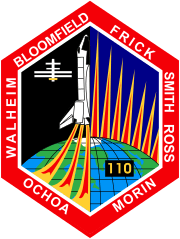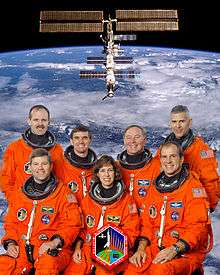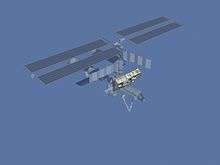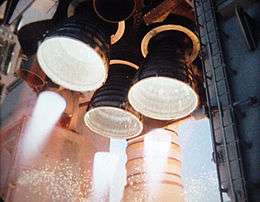STS-110
 Space Shuttle Atlantis launches on STS-110, 8 April 2002 | |||||
| Mission type | ISS assembly | ||||
|---|---|---|---|---|---|
| Operator | NASA | ||||
| COSPAR ID | 2002-018A | ||||
| SATCAT № | 27413 | ||||
| Mission duration | 10 days, 19 hours, 43 minutes, 38 seconds | ||||
| Distance travelled | 7,240,000 kilometers (4,500,000 mi) | ||||
| Orbits completed | 171 | ||||
| Spacecraft properties | |||||
| Spacecraft | Space Shuttle Atlantis | ||||
| Launch mass | 116,609 kilograms (257,079 lb)[1] | ||||
| Landing mass | 91,016 kilograms (200,657 lb)[1] | ||||
| Payload mass | 13,132 kilograms (28,951 lb) | ||||
| Crew | |||||
| Crew size | 7 | ||||
| Members |
Michael J. Bloomfield Stephen N. Frick Rex J. Walheim Ellen L. Ochoa Lee M. E. Morin Jerry L. Ross Steven L. Smith | ||||
| Start of mission | |||||
| Launch date | 8 April 2002 20:44:19 UTC | ||||
| Launch site | Kennedy LC-39B | ||||
| End of mission | |||||
| Landing date | 19 April 2002 16:26:57 UTC | ||||
| Landing site | Kennedy SLF Runway 33 | ||||
| Orbital parameters | |||||
| Reference system | Geocentric | ||||
| Regime | Low Earth | ||||
| Perigee | 155 kilometres (96 mi) | ||||
| Apogee | 225 kilometres (140 mi) | ||||
| Inclination | 51.6 degrees | ||||
| Period | 88.3 minutes | ||||
| Docking with ISS | |||||
| Docking port |
PMA-2 (Destiny forward) | ||||
| Docking date | 10 April 2002 16:05 UTC | ||||
| Undocking date | 17 April 2002 18:31 UTC | ||||
| Time docked | 7 days, 2 hours, 26 minutes | ||||
  In front, (L-R): Stephen N. Frick, Ellen L. Ochoa, Michael J. Bloomfield; In the back, (L-R): Steven L. Smith, Rex J. Walheim, Jerry L. Ross and Lee M. E. Morin.
| |||||
STS-110 was a Space Shuttle mission to the International Space Station (ISS) on 8–19 April 2002 flown by Space Shuttle Atlantis. The main purpose was to install the S0 Truss segment, which forms the backbone of the truss structure on the station.
Crew
| Position | Astronaut | |
|---|---|---|
| Commander | Michael J. Bloomfield Third spaceflight | |
| Pilot | Stephen N. Frick First spaceflight | |
| Mission Specialist 1 | Rex J. Walheim First spaceflight | |
| Mission Specialist 2 | Ellen L. Ochoa Fourth spaceflight | |
| Mission Specialist 3 | Lee M. E. Morin First spaceflight | |
| Mission Specialist 4 | Jerry L. Ross Seventh and last spaceflight | |
| Mission Specialist 5 | Steven L. Smith Fourth spaceflight | |
Mission highlights

The main purpose of STS-110 was to attach the S0 Truss segment to the International Space Station (ISS) to the Destiny Laboratory Module. It forms the backbone of the station to which the S1 and P1 truss segments were attached (on the following missions STS-112 and STS-113, respectively).
STS-110 also delivered the Mobile Transporter (MT), which is an 885 kilograms (1,951 lb) (1,950 lb) assembly that glides down rails on the station integrated trusses. The MT was designed and manufactured by Astro Aerospace in Carpinteria, CA. During the next shuttle mission, STS-111, the Mobile Base System (MBS) was mounted to the MT. This Mobile Servicing System (MSS) allows the Canadarm2 to travel down the length of the installed truss structure.
Flight Day 1: Launch
After a launch scrub on 4 April 2002 due to a hydrogen leak, Space Shuttle Atlantis successfully launched on 8 April 2002, from Launch Complex 39B. The countdown on 8 April encountered an unscheduled hold at the T-5 minute mark due to data dropouts in a backup Launch Processing System. The Launch Processing System team reloaded the required data and the countdown resumed. Liftoff occurred with 11 seconds remaining in the launch window.[2]
STS-110 was the first shuttle mission to feature the upgrade Block II main engines, which featured an "improved fuel pump...a stronger integral shaft/disk, and more robust bearings". The intent of the upgrade was to increase the flight capacity of the engines, while increasing reliability and safety.[3]
With the launch of Atlantis, mission specialist Jerry Ross became the first human to have traveled to space seven times.[4]
| Attempt | Planned | Result | Turnaround | Reason | Decision point | Weather go (%) | Notes |
|---|---|---|---|---|---|---|---|
| 1 | 4 Apr 2002, 5:17:51 pm | Scrubbed | --- | Technical | 4 Apr 2002, 9:27 am | 60% | Leak developed in a hydrogen fuel vent line[5] |
| 2 | 8 Apr 2002, 4:39:31 pm | Success | 3 days, 23 hours, 22 minutes |
Spacewalks
| Mission | Spacewalkers | Start – UTC | End – UTC | Duration | Mission | |
|---|---|---|---|---|---|---|
| 35. | STS-110 EVA 1 |
Steven Smith Rex Walheim |
11 April 2002 14:36 |
11 April 2002 22:24 |
7 h, 48 min | Installed S0 Truss on Destiny |
| 36. | STS-110 EVA 2 |
Jerry Ross Lee Morin |
13 April 2002 14:09 |
13 April 2002 21:39 |
7 h, 30 min | Continued S0 Truss install |
| 37. | STS-110 EVA 3 |
Steven Smith Rex Walheim |
14 April 2002 13:48 |
14 April 2002 20:15 |
6 h, 27 min | Reconfigure Canadarm2 for S0 truss |
| 38. | STS-110 EVA 4 |
Jerry Ross Lee Morin |
16 April 2002 14:29 |
16 April 2002 21:06 |
6 h, 37 min | Install future EVA hardware |
Media
 Launch video (1 minute 29 seconds)
Launch video (1 minute 29 seconds) The three newly enhanced Space Shuttle Main Engines ignite to launch Space Shuttle Atlantis, 8 April 2002
The three newly enhanced Space Shuttle Main Engines ignite to launch Space Shuttle Atlantis, 8 April 2002 Astronaut Lee Morin on the second spacewalk
Astronaut Lee Morin on the second spacewalk_(19_April_2002).jpg) Space Shuttle Atlantis lands at the Shuttle Landing Facility, 19 April 2002
Space Shuttle Atlantis lands at the Shuttle Landing Facility, 19 April 2002
See also
- List of human spaceflights
- List of International Space Station spacewalks
- List of Space Shuttle missions
- List of spacewalks and moonwalks 1965–1999
- Outline of space science
References
![]() This article incorporates public domain material from websites or documents of the National Aeronautics and Space Administration.
This article incorporates public domain material from websites or documents of the National Aeronautics and Space Administration.
- 1 2 "STS-110 Press Kit" (archived from Shuttlepresskit.com)
- ↑ "NASA Mission Archives STS-110". National Aeronautics and Space Administration. Retrieved 8 April 2012.
- ↑ "MSFC-0200213". Marshall Space Flight Center. Retrieved 28 November 2009.
- ↑ "STS-110 Video Highlights". National Space Society. Retrieved 28 November 2009.
- ↑ "Propellant leak at pad forces launch delay". CBS News. Retrieved 30 August 2009.
External links
- NASA mission summary
- NASA shuttle mission archive
- Status reports – Detailed NASA status reports for each day of the mission.
- STS-110 Video Highlights
